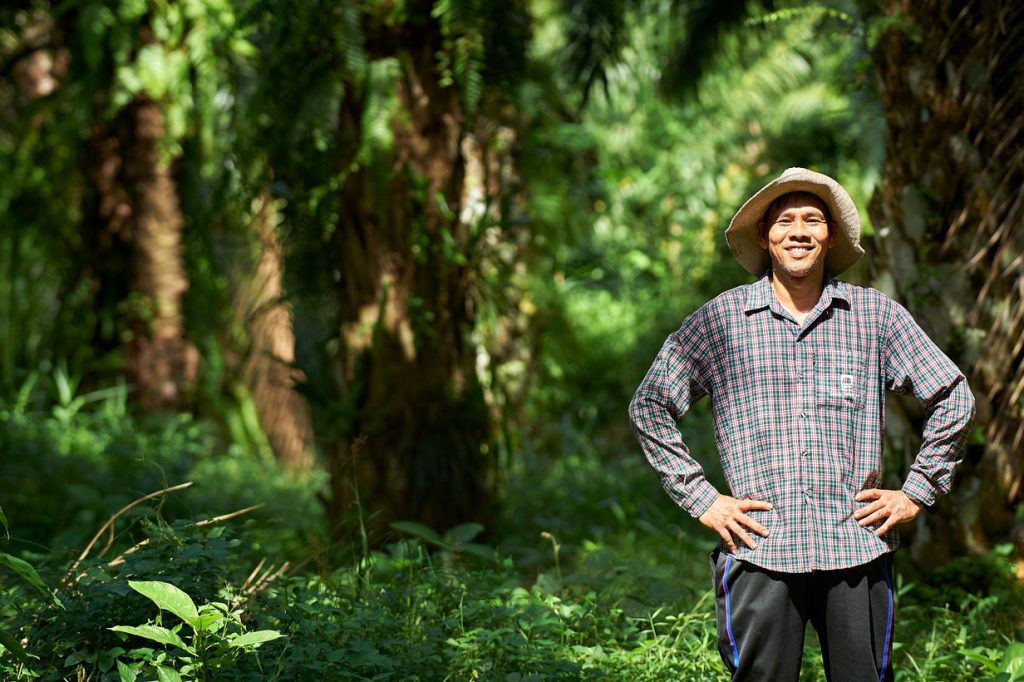
In Thailand’s palm oil industry, characterised by its significant reliance on smallholder farmers, sustainability is both a challenge and an imperative. Recognising the pivotal role of smallholders and striving to elevate their practices towards sustainability, the RSPO Independent Smallholder (ISH) Standard was introduced in 2019.
Following this progress, in 2023 the RSPO commissioned the Prince of Songkla University in Southern Thailand to undertake a rigorous study to examine the multifaceted dimensions of Thailand’s palm oil sector. The study sought to evaluate the environmental, economic and social impacts of the industry as well as to provide insights for the RSPO regarding the impacts of RSPO Certification, particularly within Thailand’s smallholder-dominated landscape.
“The key findings of the research enhances the confidence of Thai smallholders, showing that certified members gain more benefits in terms of additional volume and income, while also reducing impacts on environmental, social, and economic factors compared to non-RSPO members,” said Radda Larpnun, RSPO Technical Manager (Thailand). “Moreover, this report serves as a policy advocacy tool to support government agencies in guiding oil palm smallholders towards sustainability by providing accountable information. The recommendations act as our compass, guiding efforts to leverage the palm oil industry towards sustainability with key stakeholders, and providing a clear pathway for improving our work with Thai smallholders.”
“In Thailand’s palm oil sector, sustainability is not just a goal but a necessity,” said Dr. Sutonya Thongrak, Associate Professor, Department of Agricultural Economics and Agribusiness, Prince of Songkla University. “This research highlights that the 2019 RSPO ISH Standard and certification is a viable means to empower smallholder involvement in the adoption of sustainable practices thus enhancing environmental, economic, and social outcomes.”
Key findings from this comprehensive study are as follows:
- Industry Growth Trajectory: Thailand’s palm oil production has demonstrated consistent growth, with an annual increase of 5.64%, from 1.893 million tonnes to 2.960 million tonnes, since 2012. Predominantly concentrated in the southern region, key provinces such as Surat Thani, Krabi, Chumphon, Nakhon Si Thammarat, and Phanga serve as focal points of production.
- Economic Empowerment: The palm oil sector significantly contributes to Thailand’s economic development, providing livelihoods for approximately 400,000 farm households across the nation.
- RSPO Membership Landscape: As of May 2022, RSPO Thailand’s oil palm growers’ membership includes 63 groups of small-scale and large-scale farmers, with 19 of them being RSPO Certified independent smallholder groups. This accounts for over 5,400 farmers with a certified area of 27,295 hectares (ha), equivalent to 2.8% of the total oil palm plantation area.
- Economic Impact of RSPO Certification: Adoption of RSPO certification yields positive economic outcomes for smallholders, evident even within groups as small as 60 members, and can culminate in annual gains of up to 10.416 million Thai Baht (THB) (287,401 USD) with 260 members. Certification has also resulted in smallholders having better access to resources, market opportunities, and premium prices for fresh fruit bunches (FFB) resulting in higher yields and net returns compared to non-certified counterparts. The net oil palm income of certified smallholders in 2022 is higher than that of non-certified smallholders, at 637,826 THB (17.6 USD) and 279,943 THB (7.72 USD), respectively.
- Knowledge Transfer and Sustainability: Beyond financial gains, certification has led to improved knowledge, relationships, healthy, safety, and sustainability awareness among smallholders. Certified smallholders show higher adoption of environmentally friendly practices compared to non-certified ones.
- Growing Recognition: There is evidence of gradual adoption and recognition of the RSPO Standard in Thailand, with initiatives like the Surat Thani Provincial Oil Palm and Palm Oil Development Plan and the SCPOPP Project, clearly demonstrating RSPO objectives for oil palm development.
Towards a resilient future. Thailand’s palm oil sector stands at a pivotal juncture, propelled by collaborative efforts to integrate sustainability into its core operations. Adherence to rigorous standards and collective commitment will therefore remain paramount in ensuring a resilient and sustainable future for the industry.
For further details on this study, please download the summary reports in both English and Thai HERE.
Keep reading

Book Your Slot for the Additional prisma Clinic Session at RT2025

Advancing Jurisdictional Certification in Sabah: Strengthening Collaboration Between RSPO, UNDP, and Jurisdictional Approach System for Palm Oil (JASPO)
Call for Expression of Interest: Independent Investigation of a Complaint

Leading Labels: RSPO Among Top Sustainability Labels in Dutch Market

The 21st International Oil Palm Conference Successfully Took Place in Cartagena, Colombia

Top Performers of the 2025 Shared Responsibility Scorecard

ACOP 2024: RSPO Market Trends Resilient Despite Global Challenges

RSPO: Actions for the Certification of Sustainable Palm Oil Production




